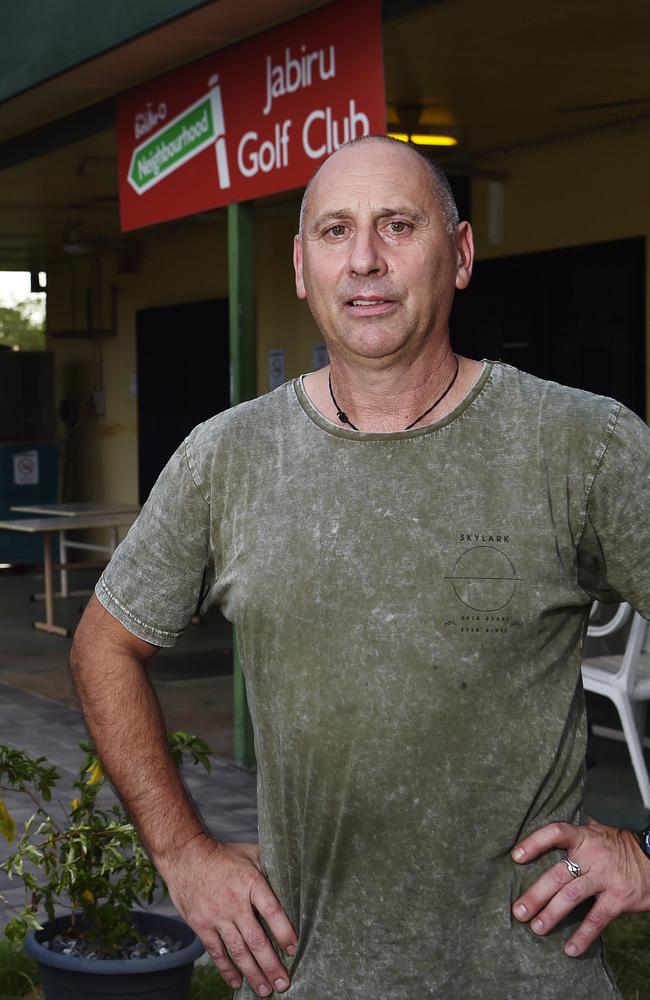Jabiru Golf Club narrowly avoids losing liquor licence after serving men involved in fatal crash
A decision has been made on a club’s liquor licence that served three drunk men who were involved in a fatal crash just minutes after leaving the venue last year.
Police & Courts
Don't miss out on the headlines from Police & Courts. Followed categories will be added to My News.
THE Jabiru Golf Club has been banned from selling alcohol for two weeks and narrowly avoided losing its liquor licence after serving three drunk men who were involved in a fatal crash minutes after leaving the venue last year.
In a decision handed down last month, the NT Liquor Commission found venue staff had repeatedly sold drinks to intoxicated customers and failed to exclude unruly patrons on the night of the crash on December 3.
The commission found the three contractors, who were drinking at the club for more than six hours, left the venue shortly before midnight “in an obviously intoxicated state” before driving away.
“Two minutes later, the car they were driving crashed, killing one of the passengers,” the decision reads.
The commission found the three men became “unsteady on their feet and were seriously affected by liquor” after the drinking session, which saw the man who later lost his life “lo(se) his balance a number of times walking backwards”.
“When they walked out of the front door of the premises all were unsteady on their feet,” the decision reads.
“One of them grabbed a palm, swung on it and fell onto the grass.”
The trio drove away at 11.43pm and crashed almost immediately, with the driver and surviving passenger later recording a blood alcohol reading more than three times the legal limit.
The commission found attending police also spoke to a “highly intoxicated” woman at the scene of the crash who told them she had been drinking at the club, despite being on the banned drinker register.
Over the course of the evening, the commission found staff had repeatedly failed to remove patrons who were so drunk they fell asleep, vomited or fell over and struggled to get up.
“Some (club management) committee members were present at the premises for social purposes, but none of them approached the two senior compliance officers, who were clearly identifiable by their Licensing NT shirts,” the decision reads.
“When senior compliance officers spoke with staff regarding two patrons who were showing signs of intoxication, staff provided the patrons with water but took no other action.”
Following a “covert inspection” of the premises a week later, the business voluntarily suspended grog sales and subsequently admitted to 15 breaches of the Liquor Act.
In suspending the club’s licence for two weeks from Monday, the commission’s acting deputy chairman Russell Goldflam said he took into account the club’s compliance with a previous enforceable undertaking and manager Peter Keepence’s co-operation and repeated expressions of remorse.

“Nevertheless, having regard to the tragic sequel to the licensee’s conduct on December 3, 2021, its occurrence only shortly after a similar breach for which the licensee had been the subject of a complaint, and the continuing failure of the licensee to rectify its operations until the intervention of the director’s officers, in the view of the commission, stern disciplinary action is required,” he said.
Mr Goldflam said “the misconduct was very serious, and gave rise to a high and readily foreseeable risk of ensuing alcohol-related harm”.
“The Commission does not suggest that the licensee caused the death that occurred on 3 December 2021, or that the licensee owed a duty of care to the deceased after he exited the premises,” he said.
“However, in this case, the licensee’s contravention of the act and breach of its licence conditions fell seriously short of the standards of conduct imposed by parliament on liquor licensees.”
Mr Goldflam said the commission had “given serious consideration” to cancelling the club’s licence but ultimately decided not to do so due to the “significant steps” it had taken to address the issues and its contribution to the local community.
“The commission intends that a message be sent to the Jabiru community that the licensee, which after all is an entity owned and run by that community, must change its practices," he said.




